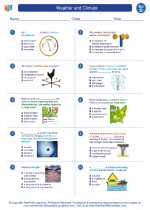Weather and Climate -> heredity
What is Heredity?
Heredity is the process by which genetic information is passed from parent to offspring. It is the reason why children share traits with their parents.
Genes and Traits
Genes are units of heredity that are passed from parents to offspring. They determine specific traits, such as eye color, hair texture, and certain predispositions to diseases.
DNA and Chromosomes
Genes are made up of DNA, which is organized into structures called chromosomes. Humans have 23 pairs of chromosomes, with one set inherited from each parent.
Mendelian Genetics
Gregor Mendel, known as the father of modern genetics, discovered the basic principles of heredity by studying pea plants. He established the concept of dominant and recessive traits, as well as the inheritance of traits through the combination of alleles.
Genetic Variation
While children inherit genes from their parents, genetic variation can occur through processes such as genetic recombination and mutations. This leads to the diversity seen within a species.
Human Heredity
Human heredity is influenced by both genetic and environmental factors. While genes play a significant role in determining traits, environmental influences can also impact how genes are expressed.
Applications of Heredity
Understanding heredity is crucial in various fields, including medicine, agriculture, and evolutionary biology. It helps in predicting and preventing genetic disorders, breeding desirable traits in plants and animals, and tracing the evolutionary history of species.
[Heredity] Related Worksheets and Study Guides:
.◂Science Worksheets and Study Guides Fourth Grade. Weather and Climate

 Activity Lesson
Activity Lesson
 Worksheet/Answer key
Worksheet/Answer key
 Worksheet/Answer key
Worksheet/Answer key
 Worksheet/Answer key
Worksheet/Answer key
 Worksheet/Answer key
Worksheet/Answer key
 Vocabulary/Answer key
Vocabulary/Answer key
 Vocabulary/Answer key
Vocabulary/Answer key
 Vocabulary/Answer key
Vocabulary/Answer key
 Vocabulary/Answer key
Vocabulary/Answer key
